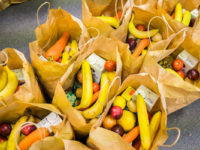 Foodbank has welcomed the launch of Australia’s first-ever National Food Waste Strategy.
Foodbank has welcomed the launch of Australia’s first-ever National Food Waste Strategy.
The food organisation said it’s a step towards providing long-term solutions to Australia’s $20 billion food waste problem.
However, Foodbank is also calling on the Federal Government to develop a National Food Insecurity Strategy, to ensure both food insecurity and food waste are addressed.
“A food waste strategy is long-overdue, but we are concerned that it appears to lack the necessary funding to ensure rapid implementation. Nevertheless, it is a great first step in reducing the amount of perfectly edible food that is wasted, particularly given this country’s worrying food insecurity problem,” Foodbank CEO, Brianna Casey said.
The latest Foodbank Hunger Report revealed 3.6 million Australians (15% of the population) were food insecure, meaning they had experienced uncertainty around where their next meal was coming from in the last 12 months. Almost half of food insecure Australians are employed with 2 in 5 of these households being families with dependent children.
“The food supply and demand equation is entirely out of balance in Australia, not helped at all by the fact that we are wasting staggering amounts of food,” Casey said. “How can it be that we produce enough food in Australia to feed approximately 60 million people, yet 3.6 million Australians were food insecure last year?”
Foodbank argues that the issue is not so much that there is not enough food, but that the food isn’t getting to the right places, in the right time, to help address food insecurity and avoid waste. As such, they are calling on the Federal Government to complement its National Food Waste Strategy with a whole-of-government strategy to address Australia’s growing food insecurity crisis.
To combat hunger in Australia, Foodbank works closely with farmers, manufacturers, and retailers, to source fresh and manufactured foods for vulnerable Australians in need. The farm sector generously donates large volumes of fresh produce each year, with last financial year’s donations including:
- 112,000 kilograms of unprocessed and manufactured rice and grain products,
- 1.2 million litres of fresh milk,
- 196,000 kilograms of meat,
- 5.8 million kilograms of fruit and vegetables, and
- 112,000 kilograms of eggs.
“Only one day out from National Agriculture Day, it is important that our farmers across the country know that the entire supply chain will be working together to ensure the wonderful, fresh produce they work so hard to grow will not be wasted,” Casey said.
“Farmers right across Australia are already donating huge volumes of fresh produce to Foodbank, and we’re not just talking about the produce that doesn’t meet cosmetic standards. Many farmers are regularly donating first-grade produce to Foodbank to help families, just like their own, who are doing it tough right now.
“We are so grateful to our farm sector and the food and grocery industry for their ongoing commitment to helping everyday Australians who are going through tough times, helping Foodbank tackle both food insecurity and food waste.”











